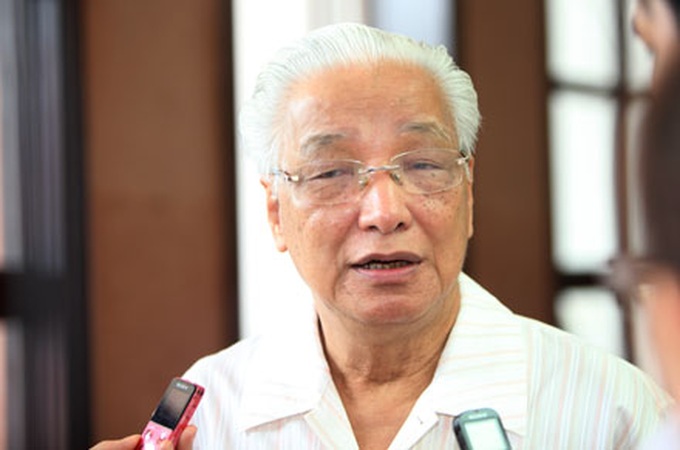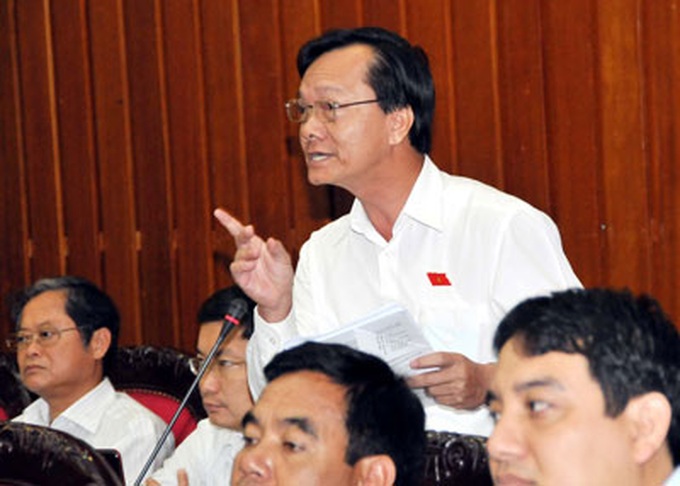Amid the East Sea dispute, many National Assembly (NA) deputies have suggested that Vietnam take on a policy that would make it less economically dependent on China.
Several NA deputies agreed that Vietnam is facing new difficulties due to China’s increasingly aggressive actions on the East Sea.
Cao Si Kiem, NA deputy from Thai Binh Province and Chairman of the Vietnam Association of Small and Medium-sized Enterprises, pointed out some existing problems, including unstable economic growth and purchasing power, high inventory rates and the rising rate of bad debt. These, he said, could become obstacles to Vietnam's economic development.

Chairman of the Vietnam Association of Small and Medium-sized Enterprises,Cao Si Kiem.
Kiem suggested that the country aggressively implement the Central Party’s Resolution on the economy, as well as the Government Resolution of May over the remaining seven months of the year.
“Due attention should be paid to our current weaknesses so that we can work out the best solution. A plan, both for the short-term and the long term should be thought out in response to China’s escalation in the East Sea. It should be a decisive plan, but it should not be made hastily," he noted.
Many other NA deputies agreed in theory, urging voicing their opinion that the country must take measures to reduce dependence on economic relations with China.
“The government should support farmers and export firms in seeking new markets, especially for our farm products. We should also improve the quality of our products so that they can be made available in markets with more demanding standards,” said Ha Sy Dong, NA deputy from the central province of Quang Tri.

NA deputy Ha Sy Dong
The government was also urged to work out a strategy to attract more resources to the seafood production industry. The suggestions made included giving preferential loans to fishermen in order to build ships reinforced with metal.
“Vietnam is currently quite dependent on its economic relations with China, which puts Vietnam at a disadvantage while tensions are rising on the East Sea. It’s necessary now to speed up the development of our industries and gradually adjust to new export markets for our agricultural products,” said Huynh Ngoc Dang, NA deputy from Binh Duong Province.

NA deputy Huynh Ngoc Dang
He was careful to add, however, that such new policies would not be a signal of the cancellation of economic relations between the countries, but just measures taken to increase cooperation with a wider range of trading partners.
Dr. Vu Tien Loc, NA Deputy from Thai Binh Province and Chairman of the Vietnam Chamber of Commerce and Industry (VCCI), said trade agreements that have already been signed and potential new agreements would open up opportunities for Vietnam and lessen its dependence on China.

Dr. Vu Tien Loc
According to Loc, Vietnam imports around 60% of garment textiles from China. Up to 90% of Engineering, Procurement, Construction contracts for hydro-power projects in Vietnam have been implemented by Chinese contractors. China is also Vietnam’s biggest fruits and vegetables export market and the country’s main buyer of rice.
“Even though Vietnam’s exports to China are often priced low, tax and customs procedures for exports to the market are much more simple than those to US and European markets. Despite rising tensions in the East Sea, China may take into account the benefits in economic relations with Vietnam before applying any strict economic sanctions. The economic relations between the two countries brings revenue to several poor districts both in China and Vietnam,” Loc added.
